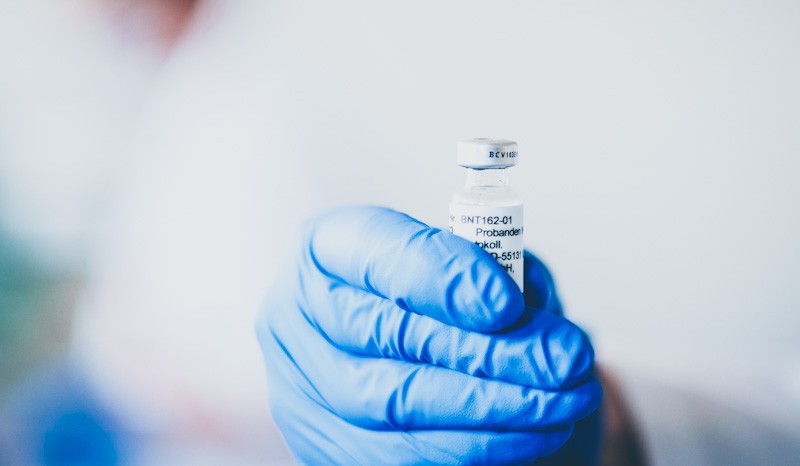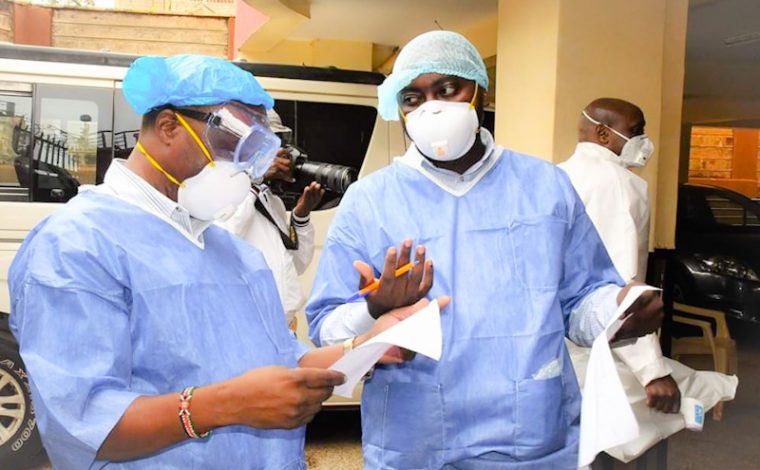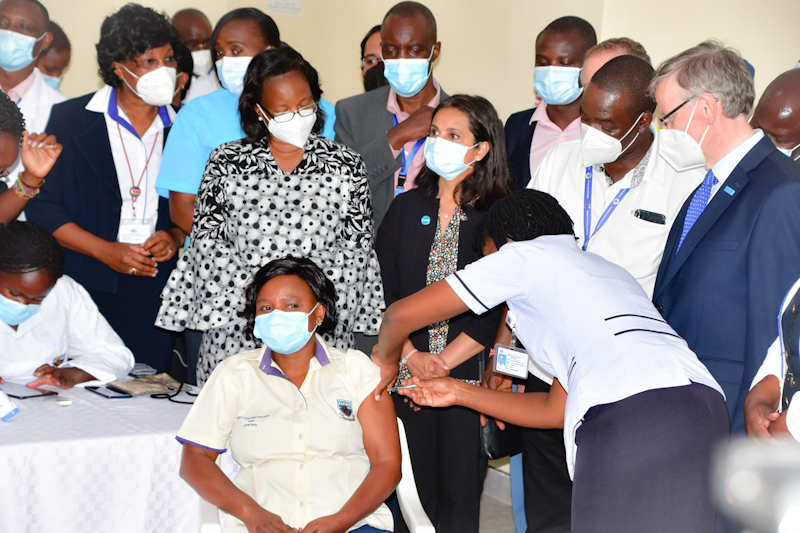- An increase in COVID-19 vaccine conspiracies is causing many Kenyans to forego vaccinations.
Kenya has vaccinated only a tiny fraction of its populations, more than one million people have received COVID-19 vaccines. As of 16 June, 991,184 people had received their first dose, while 164,561 were fully vaccinated.
Though the rate of new COVID-19 infections is declining in some regions, misinformation from anti-vaccination campaigners continues to spread and gain more traction online.
Some of the reasons for vaccine hesitancy include: an underlying distrust of government; questions about whether the vaccines are effective; wild conspiracy theories and myths; and people are tired of wearing masks and social distancing.
In a survey done by this writer, the majority of Kenyans in Roysambu, Nairobi expressed scepticism about taking vaccines due to different myths.
“I am not going to get vaccinated; I saw videos on Tiktok where COVID-19 vaccinated people were sticking coins and magnets to their arms, which means the vaccines have magnets in them,” said Dennis Wamocha,32, a nail technician.
Phillis Mwangi, 54, questioned Kenya’s health ministry directive asking the vaccinated people to continue observing social distancing and wearing masks in public.
“Why is the government saying, after being vaccinated, we should still maintain social distance and wear masks. If I am vaccinated, I can’t get the disease, so why are we being told to wear masks? Phillis posed.
Victor Watite, a matatu driver, said: “All the leaders should take the vaccine first to lead by example. We need to be sure there is no tracking device in the vaccine.”
He believes there must be “trust between government and people” for him to take the vaccine. Others like Vanessa Jeruto, 34, said that she would get vaccinated as she believes “the government wants COVID-19 to end as many businesses have stalled and people have lost their jobs.”
Esther Mumbi, a receptionist, said the only reason why she will take the vaccine is her job depends on it.
She says, “working in a place where I am meeting a lot of people makes me vulnerable, and I might lose my job if I refuse to get vaccinated as I work for an international firm.”
Simon Mwangi, a student at Zetech University, said: “I saw a video of Bill Gates confirming that people have to die to reduce population, and that’s why Africa is getting vaccines that have expired.”
He noted that this is his main reason why he cannot get vaccinated as he doesn’t trust “vaccines that are not made in Africa.”
Rita Nyawira, a medical doctor in Nairobi, when asked why people are not getting vaccines, says the failure to get vaccinated is due to vaccine hesitancy among the old population, and underdeveloped health care systems, especially in rural areas.
“The health care system which needs to deliver the vaccines to its citizens is not working properly, especially in rural areas. So, most old people are far away from where they can get access to health centres where vaccines are administered, and as a consequence, they are definitely left out, but they remain at risk of getting exposed to COVID-19,” Nyawira said.

But are the claims about vaccines valid?
There is a lot of false information and conspiracy theories surrounding the COVID-19 vaccines that are making people be skeptic of getting it, here are some of the top misconception that has been debunked;
-
COVID-19 vaccines don’t cause magnetic reactions
The claim started with Tiktok videos of people placing magnets on their arms and alleging that magnets can stick, but there is no evidence to support the false claim that the jabs contain ingredients that result in a magnetic effect.
Medical professionals at the Meedan Health Desk say that even if COVID-19 vaccines contain metals, they will not cause a magnetic reaction.
“Only certain metals can trigger magnetic reactions, and the vaccine does not contain any metals at all. That means it can’t cause a magnetic response when it’s injected.” health experts at Meedan said.
Additionally, “The amount of metal that would need to be in a vaccine for it to attract a magnet is much more substantial than the amounts that could be present in a vaccine’s small dose.”
On 3 June, the Centers for Disease Control and Prevention said: “Receiving a COVID-19 vaccine will not make you magnetic, including at the site of vaccination which is usually your arm. COVID-19 vaccines do not contain ingredients that can produce an electromagnetic field at the site of your injection.”
They noted: “All COVID-19 vaccines are free from metals such as iron, nickel, cobalt, lithium, and rare earth alloys, as well as any manufactured products such as microelectronics, electrodes, carbon nanotubes, and nanowire semiconductors.”
In addition, “the typical dose for a COVID-19 vaccine is less than a millilitre, which is not enough to allow magnets to be attracted to your vaccination site” the agency said. ” even if the vaccine was filled with a magnetic metal.”
-
COVID-19 vaccines don’t contain microchips
The claim that the COVID-19 vaccines contain microchips originates from a conspiracy theory video claiming Microsoft co-founder Bill Gates is behind a global scheme to implant and track billions of people secretly.
The misinformation started from an edited video that created a misleading combination from two parts of Bill Gates’ speech during the September 2013 Alliance for Financial Inclusion’s, Global Policy Forum (GPF).
The original video reveals that Mr Gates referred to vaccines as examples of the breakthrough innovations that have positively changed the future for billions of people worldwide. Later, he talks about a “measurement system,” but about the need for a system that can track progress and ensures participants benefit from financial inclusion and not vaccines. Unfortunately, two points from the original clip are cut and put together, altering the meaning in the process.
The clip also includes footage from the launch of a 2019 United Nations report on digital cooperation, which appears at timestamp one minute 33 seconds.
Yes, the video includes authentic commentary but when paired up within news reports of microchips, the remarks become sinister. In the fabricated video, the co-chair of the Gates Foundation notes that technology gives incredible opportunities to create “the world that we want”. But the complete footage shows Ms Gates was referring to the use of technology to ensure a “more just and humane world”.
The altered video includes other clips from old news reports about the microchip technology in humans unrelated to the COVID-19 vaccine.
At the 3rd minute, it includes footage from an authentic PBS NewsHour show. Still, the comment by the anchor is edited and words have been selectively and intentionally cropped to make it look like she said, people who support the implantation of microchips do it to “take back control.”
However, while original footage shows the broadcast actually covered the use of human microchips, the sentence referred to those who are in favour of the practice, who feel it enables them “take back control of their data.”

-
COVID-19 vaccine is not being used for population control
These claims started from a short clip shared on social media that seemed to be cut from a 98-minute video posted on YouTube by the International Tribunal for Natural Justice (ITNJ).
The video shows a speaker identified as Robert Young addressing a panel. Mr Young, without citing evidence, claims in the video that the Microsoft co-founder said billions of people need to die to reduce the world population.
“In the words of Bill Gates, at least three billion people need to die,” Mr Young says. “So we’ll just start in Africa, we’ll start doing our research there, and we’ll eliminate most of the Africans because they’re deplorable.”
Mr Young does not say where or when Mr Gates made the statement but implies the quote is in the public domain. However, there is no record of Mr Gates making the remarks, nor are there any media reports corroborating the claim.
A search through the Gates Foundation website, the philanthropist’s blog, and verified social media accounts found no evidence of him making the statement that was attributed to him in the video.
Mr Young’s statement appears to misrepresent comments Mr Gates made during a TED Talk in 2010, when he said, vaccines and improved health care could help reduce the rate of global population growth, which will, in turn, reduce carbon emissions.
“The world today has 6.8 billion people, that’s headed up to about nine billion.” Mr Gates said, “If we do a really great job on new vaccines, health care, reproductive health services, we could lower that by, perhaps, 10 or 15%.”
-
The COVID-19 vaccine is not safe as it was developed so quickly
Before the arrival of the new coronavirus (SARS-CoV-2), there was much research done on similar coronaviruses called SARS and MERS.
When COVID-19 became a global pandemic, governments and companies put resources toward prioritising treatments and vaccines. Researchers have been developing and studying an mRNA vaccine platform for many years, so, once the SARS-CoV-2 was sequenced, it took a short time to make the mRNA vaccine candidates.
Vaccine hesitancy is an emerging problem in Kenya. However, the WHO suggests that a comprehensive approach targeting multiple facets of social interaction is more likely to dispel the myths and address the hesitancy. The agency considers the benefits of receiving vaccines is greater than the risk of contracting COVID-19.
To address vaccine hesitancy and scepticism in Kenya, the government and the public health officials must work together to address some of the prevalent myths that are making people fear vaccines and counter them with accurate information.





1 Comment
Pingback: Kenya Needs a ‘Booster’ for its Overstretched Health Sector